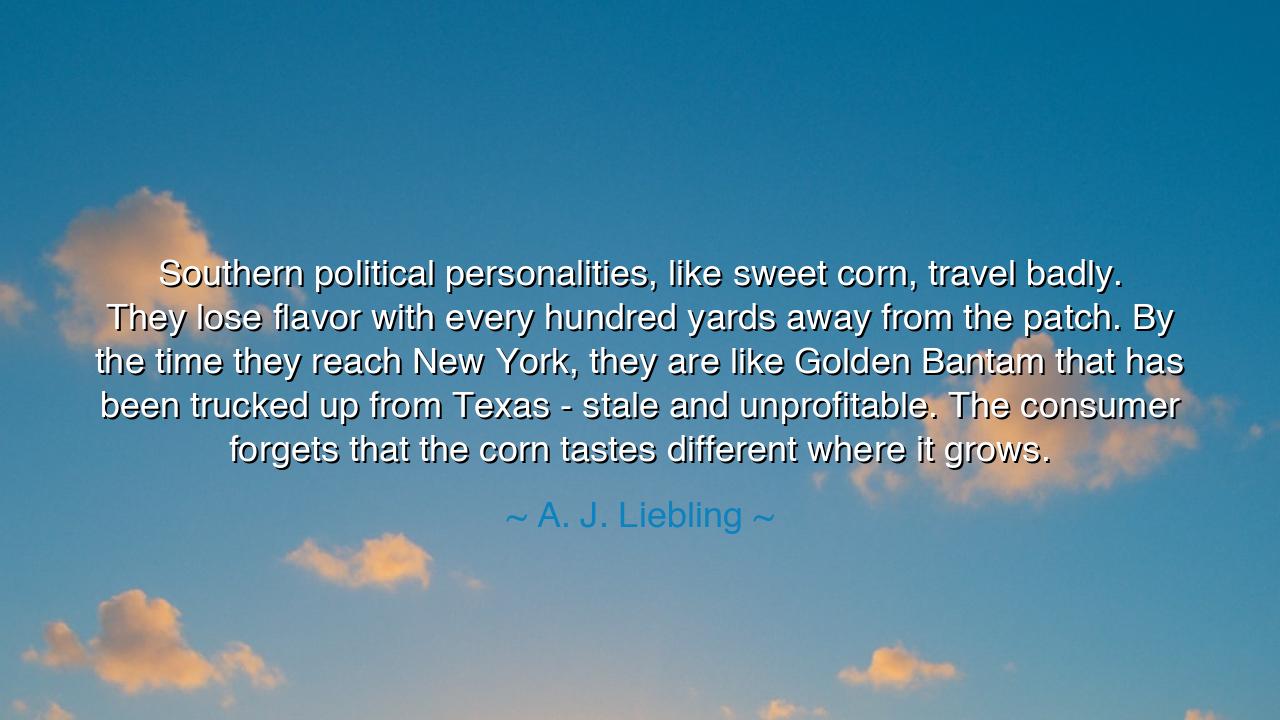
Southern political personalities, like sweet corn, travel badly.
Southern political personalities, like sweet corn, travel badly. They lose flavor with every hundred yards away from the patch. By the time they reach New York, they are like Golden Bantam that has been trucked up from Texas - stale and unprofitable. The consumer forgets that the corn tastes different where it grows.






In the words of A. J. Liebling, journalist and keen observer of men and nations, we encounter a metaphor sharp and unforgettable: “Southern political personalities, like sweet corn, travel badly. They lose flavor with every hundred yards away from the patch. By the time they reach New York, they are like Golden Bantam that has been trucked up from Texas—stale and unprofitable. The consumer forgets that the corn tastes different where it grows.” Though rooted in wit, this saying carries the force of wisdom: that character, charm, and persuasion are often bound to their native soil, and that context gives power which distance dissolves.
To compare a politician to sweet corn is no accident. For just as corn must be eaten fresh from the stalk to taste its full sweetness, some leaders draw their strength from the familiarity of place, from accents, customs, and cultural soil. In their homeland, they shine with vigor, for the people know their tongue and savor their presence. Yet once carried beyond their origin, their uniqueness fades, and what was once fragrant becomes ordinary—or worse, unpalatable. Liebling thus reminds us that power is not only in the person, but in the soil that nourishes them.
This wisdom has echoes in history. Consider Demosthenes, the great orator of Athens. In his city, his words stirred hearts and roused citizens to resist Macedon. But had he spoken the same speeches in Sparta, or Persia, his power would have been diminished, for his strength lay in being understood within the soil of Athenian democracy. His voice was like fresh corn: bursting with sweetness at home, but losing savor in foreign ears.
Liebling also warns of the danger of forgetting that “corn tastes different where it grows.” The consumer in New York, tasting corn brought from Texas, may judge it stale, not realizing that in its homeland it was vibrant and sweet. Likewise, those who hear a Southern politician outside the South may dismiss him as dull or ineffective, not perceiving the richness he carried in his own land. The lesson is that judgment without context is shallow, for the soil of origin shapes both flavor and force.
The metaphor of travel badly reminds us of a truth about human beings: not all qualities are universal. Some virtues—wit, eloquence, charisma—are woven tightly into local traditions, dialects, and shared memory. When removed from that environment, they weaken. This does not mean they lack value, but that value must be understood in relation to place. Just as wine takes its character from the vineyard, so too does the politician take his vigor from the culture in which he is rooted.
And yet, there is also caution here. For if one wishes to lead beyond one’s patch, one must learn to translate oneself. The greatest leaders of history—such as Abraham Lincoln—were deeply local in their roots, yet learned to express themselves in ways that reached far beyond their region. Lincoln was of the frontier, yet his words at Gettysburg became immortal for all people, not only for those of Illinois or Kentucky. He proved that while some flavors fade with travel, others—if distilled with wisdom—become timeless.
The lesson is clear: understand the soil from which you grow, and do not forget it. Do not judge others without knowing theirs. Cherish the local, the rooted, the unique flavor of your place. But also learn how to refine and share that flavor in a way that endures when carried afar. For though much sweetness fades with distance, the essence of truth, spoken well, can transcend soil and season, and feed the hearts of all who hear.
So I say to you: value your roots, as the corn values the earth that sustains it. But do not be content with sweetness that perishes in travel. Seek to turn your virtues into something that, like grain, can nourish across time and distance. For then, though you may begin as corn fresh from the patch, you will end as bread upon the table of nations.






AAdministratorAdministrator
Welcome, honored guests. Please leave a comment, we will respond soon